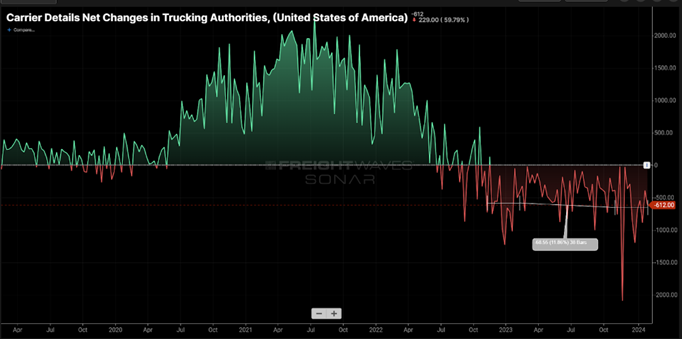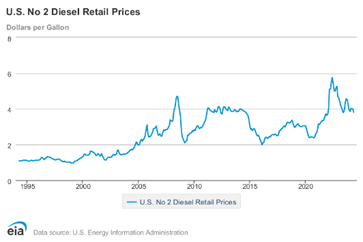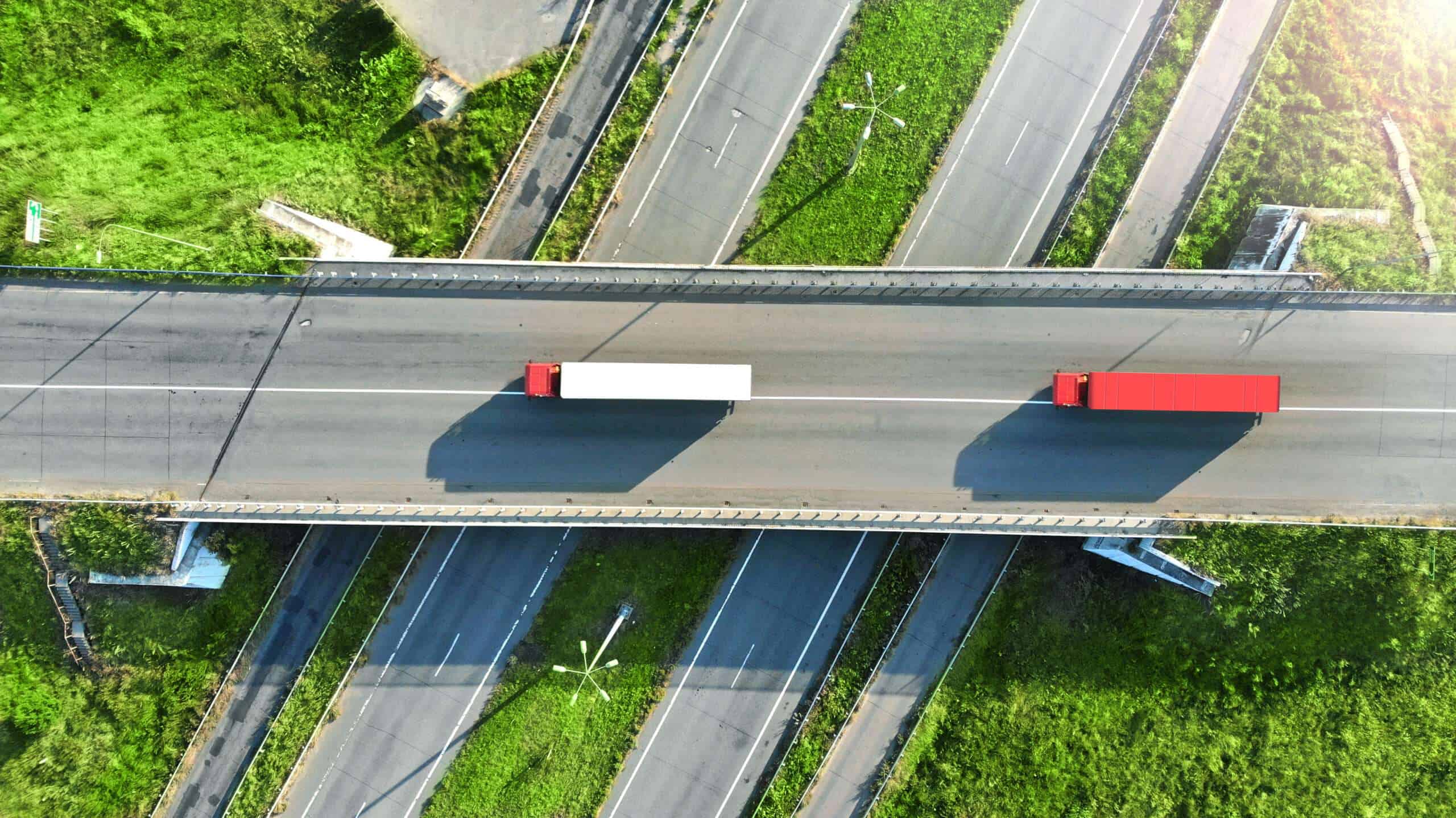Navigating the trucking industry recently feels like trying to steer a ship through stormy waters. The industry is experiencing significant challenges that keep adding pressure to carriers and reshaping the trucking landscape. Throughout this blog post, we will walk you through some of the most important trends and help you prepare for coming challenges.
Excess capacity remains
The trucking market is still adjusting from the massive expansion experienced between 2019 and 2020. It is estimated that 28% more trucks were added to the industry during this timeframe, and despite trucking authorities having a significant decrease of ~38,500 over the past year, the exit rate is not happening as fast to match low demand levels.
Dean Croke, principal analyst at DAT Freight and Analytics, explained that the excess capacity can be attributed to small carriers not leaving the industry as fast as they normally would in adverse conditions. Owner-operators have less financial pressure to exit due to record earnings in 2021 and have even been selective on what freight they decide to move.
Carriers can expect a faster decline in trucking authorities in the upcoming months if freight demand and volume remain low as carriers run out of savings.

Source: FreightWaves, Trucking authority correction accelerates
Freight demand and shipper spending decline
Soft market demand has been prevalent throughout this recessionary period. According to the U.S. Bank Freight Payment Index, shippers spending decreased 27.9% and shipments declined 21.6% in the first quarter of 2024 compared to 2023. We forecast freight volume will remain low in the next quarter as other indexes like the Cass Freight Index and ATA trucking tonnage index show a similar trend, a slight recovery in February followed by a year-over-year decline in the following months.
Technology and market intelligence keep the industry competitive
The technological tools for brokerages and carriers have advanced to the point where what was once considered sophisticated software is now widely accessible, eliminating the previous advantages held by large fleets. For the remainder of the year, trucking companies will reevaluate their current technology and look for new opportunities to integrate tools to optimize driver assignments, asset utilization, and unlocking profitability despite
"The technology component for brokerages and carriers has reached the point where when I was at US Express, the tech in the early 2000s was sophisticated, but now everyone's using this. So, the advantage has gone away for large fleets," Thomas Wasson, Enterprise Trucking Carrier Expert at FreightWaves said.
Private fleets take a portion of for-hire volumes
US shippers have increased their private fleets used over the past year, which has been driven by the need for stability, consistency, and predictability in complex supply chains. Private fleets are currently impacting the for-hire trucking market by taking a share of the volume, leading to a temporary imbalance. Expect to see an increase in demand for 3PL services as private fleets source for capacity and try to remain competitive.
"Shippers invested heavily in private fleets after seeing the advantages offered through the last upcycle," David Spencer, VP of Market Intelligence at Arrive Logistics said.
Sustainability adds pressure
Trucking is experiencing a significant transformation towards sustainability. This shift has been mainly driven by new regulations at the federal and state levels. Policies like the California Advanced Clean Trucks (ACT) regulation and EPA's phase three regulations for greenhouse emissions are adding financial pressure to the industry in this cyclical downturn.
Organizations like the American Trucking Association have already raised concerns about the attainability of the targets. We can expect to see the shift towards sustainability as a force pushing exit and decreasing capacity to some extent in the upcoming years.
Rise in operational costs
While diesel prices have started to stabilize and even trend downward compared to last year, other costs like insurance premiums have increased by an average of 98% compared to 7.3% last quarter. Expect to see trucking carriers ripping off the benefits of reliable technology and sharing their data with insurance companies to negotiate lower premiums.

What should carriers do to respond to market conditions?
If you are looking for strategies to navigate this recessionary period, we are here to help! Optym has hosted a panel with leading trucking experts to bring an integral analysis of what is happening in the market and strategies to help you navigate this period of uncertainty. Access this exclusive content in our Ebook or watch the webinar recording.
Panel participants:
- Dean Croke – Principal Analyst at DAT Freight and Analytics
- Zach Strickland – Director of Freight Market Intelligence at FreightWaves
- David Spencer – VP of Market Intelligence at Arrive Logistics
- Thomas Wasson – Enterprise Trucking Carrier Expert at FreightWaves
{% module_block module "widget_9a74a187-5038-43bc-a34d-847641698bbc" %}{% module_attribute "button_text" is_json="true" %}{% raw %}"Download Free Ebook "{% endraw %}{% end_module_attribute %}{% module_attribute "child_css" is_json="true" %}{% raw %}{}{% endraw %}{% end_module_attribute %}{% module_attribute "css" is_json="true" %}{% raw %}{}{% endraw %}{% end_module_attribute %}{% module_attribute "definition_id" is_json="true" %}{% raw %}null{% endraw %}{% end_module_attribute %}{% module_attribute "field_types" is_json="true" %}{% raw %}{"button_text":"text","link":"link","style":"group"}{% endraw %}{% end_module_attribute %}{% module_attribute "label" is_json="true" %}{% raw %}null{% endraw %}{% end_module_attribute %}{% module_attribute "link" is_json="true" %}{% raw %}{"no_follow":false,"open_in_new_tab":false,"rel":"","sponsored":false,"url":{"content_id":170689055906,"href":null,"type":"CONTENT"},"user_generated_content":false}{% endraw %}{% end_module_attribute %}{% module_attribute "module_id" is_json="true" %}{% raw %}8243667{% endraw %}{% end_module_attribute %}{% module_attribute "path" is_json="true" %}{% raw %}"@hubspot/button"{% endraw %}{% end_module_attribute %}{% module_attribute "schema_version" is_json="true" %}{% raw %}2{% endraw %}{% end_module_attribute %}{% module_attribute "smart_objects" is_json="true" %}{% raw %}[]{% endraw %}{% end_module_attribute %}{% module_attribute "smart_type" is_json="true" %}{% raw %}"NOT_SMART"{% endraw %}{% end_module_attribute %}{% module_attribute "tag" is_json="true" %}{% raw %}"module"{% endraw %}{% end_module_attribute %}{% module_attribute "type" is_json="true" %}{% raw %}"module"{% endraw %}{% end_module_attribute %}{% module_attribute "wrap_field_tag" is_json="true" %}{% raw %}"div"{% endraw %}{% end_module_attribute %}{% end_module_block %}

-2.jpg)


